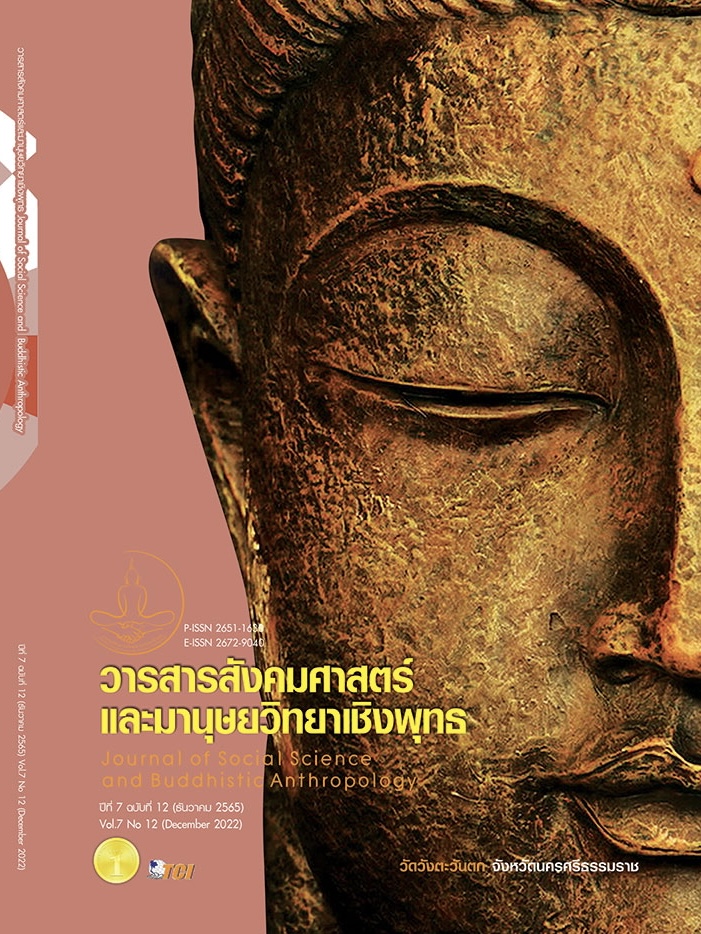BRAND ADVOCACY FOR FOOD BUSINESS ON SOCIAL MEDIA IN THAILAND
Keywords:
Food Business, Social Media, Brand AdvocacyAbstract
The research paper has two objectives : 1) to study and analyze the components of a brand support model for food and dining businesses on social media in Thailand and 2) to simulate the relationship model of brand advocacy for food and dining businesses on social media in Thailand. This research is a quantitative research. The sample group is consumers who use social media through the Instagram application in food and dining businesses in Thailand age over 18 years and have been using Instagram for at least 1 year, a total of 737 samples with convenience random sampling. The instrument used for data collection was an online questionnaire. It consisted of 73 questions to measure all latent variables by using the estimation scale as a measure. The researcher divided the attitude score into 7 levels. The factor analysis confirmed the complex regression equation using structural equation modeling (SEM). The study found that the influence coefficients for all variables were positive and supported all variables, which model the relationship of brand advocacy, include on micro-influence factors, perceived brand authenticity factors, subjective norm factor, impression management factors, brand use factor affecting brand trust factors and brand advocacy. The most influencing factor is brand trust factor affecting brand advocacy (β = 0.668, P < 0.001).
References
Aaker, D.A., & Joachimsthaler, E. . (2009). Brand Leadership. New York: Simon & Schuster.
Badrinarayanan, V., & Laverie, D. . (2013). The Role of Manufacturers’ Salespeople in Inducing Brand Advocacy by Retail Sales Associates. The Journal of Marketing Theory and Practice, 21(1), 59-72.
Bruns, I. . (2018). ‘Trust’ and ‘perceived authenticity’ in social media driven influencer marketing and their influence on intentions-to-buy of 18-24-year-olds in Ireland. Ireland: Dublin Business School.
Djafarova, E., & Rushworth, C. (2017). Exploring the credibility of online celebrities’ Instagram profiles in influencing the purchase decisions of young female users. Computers in Human Behavior, 68(1), 1-7.
Elenopoulou, C. (2018). Lifestyle micro-influencers and the practice of product endorsement on Instagram through the eyes of young female users. Retrieved May 15, 2019, from https://www.thesis.eur.nl/pub/43796/
Foong, L.S., & Yazdanifard, R. (2014). Celebrity endorsement as a marketing tool. Global Journal of Management and Business Research: E Marketing, 14(4), 37-40.
Habibi, M.R. et al . (2014b). The roles of brand community and community engagement in building brand trust on social media. Computers in Human Behavior, 37(1), 152-161.
Habibi, M.R. et al. (2014a). Brand communities based in social media: How unique are they? Evidence from two exemplary brand communities. International Journal of Information Management, 34(2), 123-132.
Habibi, M.R. et al. (2016). Testing an extended model of consumer behavior in the context of social media-based brand communities. Computers in Human Behavior, 62(1), 292-302.
Hair, J.F. et al. (2006). Multivariate data analysis. (6th ed) . Upper Saddle River, NJ: Pearson Prentice Hall.
Hair, J.F. et al. (2010). Multivariate data analysis with readings. (4th ed). Englewood Cliffs, NJ: Prentice-Hall.
Hair, J.F. et al. (2018). Multivariate Data Analysis: Pearson New International Edition. (7th ed). New York: pearson.
Hassan, M. et al. (2016). Impact of Differentiated Customer Service, Brand Trust, Brand Commitment, and Brand Salience on Brand Advocacy. International Review of Management and Marketing, 6(4), 232-238.
Keller, K.L. . (2002). Branding and Brand Equity. Cambridge: Marketing Science Institute.
Keller, K.L. (2007). Strategic Brand Management. (3rd ed). Upper Saddle River, NJ: Prentice Hall.
Kotler, P. et al. (2017). Marketing For Competitiveness: Asia To The World - In The Age Of Digital Consumers. Singapore: World Scientific.
Laroche, M. et al. (2012). The effects of social media based brand communities on brand community markers, value creation practices, brand trust and brand loyalty. Computers in Human Behavior, 28(5), 1755-1767.
Lou, C., & Yuan, S. (2019). Influencer Marketing: How Message Value and Credibility Affect Consumer Trust of Branded Content on Social Media. Journal of Interactive Advertising, 19(1), 58-73.
McCormick, K. (2016). Celebrity endorsements: Influence of a product-endorser match on Millennials attitudes and purchase intentions. Journal of Retailing and Consumer Services, 32(1), 39-45.
Pallant, J. . (2007). SPSS survival manual: A step by step guild to data analysis using SPSS for Windows (Version 15). (3rd ed). Crows Nest: Allen & Unwin.
Rai, S., & Nayak, J.K. . (2019). Hospitality branding in emerging economies: An Indian perspective. Journal of Tourism Futures, 5(1), 22-34.
Shan, Y., & King, K.W. (2015). The Effects of Interpersonal Tie Strength and Subjective Norms on Consumers’ Brand-Related eWOM Referral Intentions. Journal of Interactive Advertising, 15(1), 16-27.
Siam Commercial Bank Economic Intelligence Center [SCBEIC]. (2019). ส่องเทรนด์ธุรกิจร้านอาหาร...ยังน่าลงทุนอยู่หรือไม่? เรียกใช้เมื่อ 12 มกราคม 2563 จาก http://www.scbeic. com/th/detail/product/6167
Steven, J.P. (2009). Applied Multivariate Statistics for the Social Science. (5th ed). New York: Taylor & Francis Group.
Sultoni, M. et al. (2019). Digital Content by Online Media and Its Effects on Brand Trust, Brand Credibility, Brand Commitment, and Brand Advocacy (Case on Instagram Account Tirto.id). Singapore: IEEE.
ThaiPublica. (2559). PwC ชี้คนไทยครองแชมป์ช็อปออนไลน์มากสุดในโลก ยุค‘มิลเลนเนียล’ผู้นำโมบายช็อปปิ้ง. เรียกใช้เมื่อ 28 พฤศจิกายน 2562 จาก https://www. thaipublica.org/2016/04/pwc-18-4-2559/
Uzunolu, E., & Kip, S.M. . (2014). Brand communication through digital influencers: Leveraging blogger engagement. International Journal of Information Management, 34(5), 592-602.
Wisesight. (2019). Thailand's Influencer Report by Wisesight. เรียกใช้เมื่อ 23 October 2019 จาก https://www.influencer.wisesight.com/
Zikmund, W.G. et al. (2010). Business Research Methods. Moson, Ohio: South Western Cengage Learning.
Downloads
Published
How to Cite
Issue
Section
License
Copyright (c) 2022 Journal of Social Science and Buddhistic Anthropology

This work is licensed under a Creative Commons Attribution-NonCommercial-NoDerivatives 4.0 International License.









